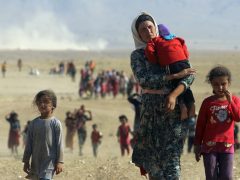Plight of the Yezidis
Yezidis, an ethno-religious minority in Northern Iraq have suffered centuries of persecution due to the attacks from Muslim extremists in the middle east. They are currently undergoing a great genocide by the hands of ISIS who have occupied many parts of Syria and northern Iraq which includes the areas where Yezidis live. The previous genocides have pushed many of the yezidis to emigrate to European and North American nations. The current attack by ISIS if continued can lead to complete destruction and desolation of the Yezidi homeland in Iraq.
Yezidis are strongly opposed religious conversion. After the advent and spread of Islam in the middle east the yezidi community has strongly resisted the conversion to Islam. This has led to conflicts and to the persecution of the community by extremists. It forms the basis of the memory of 72 earlier genocides against the yezidi community. It is estimated that 23 million Yezidis have been killed in these genocides in the past 700 years. Their population continues to decrease. It was estimated to be 2 million about 200 years ago and currently it is less than a million. Atrocities on Yezidis under ottoman rule are well recorded. In the 1980s, Saddam Hussein’s government in Iraq started the Al-Anfal campaign which aimed at attacking the Kurdish fighters and civilians. The Yezidis fell victim to this campaign and in 1988 Iraqi forces destroyed about 100 Yezidi villages. Saddam Hussein’s rule , was followed by insurgency and civil war in which Yezidi villages were caught in between the fight of Shia and Sunni groups. During this time in 2007, four coordinated suicide bombs were detonated in the Yezidi towns of Kahtaniya and Jazeera, near Mosul. About 796 Yezidis were killed and 1,562 were wounded.
Still, the greatest suffering for Yezidi communities has been due to the ISIS. In the early months of 2014, ISIS began to capture areas of Northern Syria and move towards northern Iraq. Their unabated progress continued and on August 3rd they reached Sinjar which is the homeland of many yezidis. Yezidis initially tried to fight back but the yezidi fighters were killed in large numbers women and girls were abducted. Some of the yezidi women, elderly and children took refuge in the Sinjar mountains. They had to stay on the mountains for many days without food and other supplies which lead to the death of 200 people. Later few of the yezidis did manage to escape to Turkey with the help of PKK and other organisations but they too are dire straits in refugee camps. Most of the yezidi population of Iraq today is still displaced or fighting against the ISIS. Many international organisations are trying to help the yezidis but more effort and engagement is required from governments of different countries and the International community as a whole to provide relief to yezidis.

